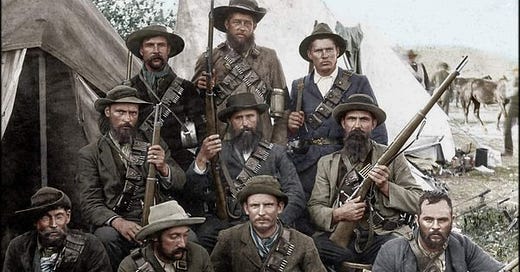It’s not the war against ISIS either.
Nor is it Afghanistan or Vietnam.
It’s the Second Boer War (1899 – 1902).
The politics and geography of the Gaza War and Second Boer War are totally different, so different I see no point in even comparing and contrasting them, but tactically, there’s a lot that one can teach us about the other. Possibly more than any other war in history.
After capturing the cities of the hostile Boer republics, the British believed victory was at hand. Instead, they encountered a second, far bloodier phase of the war. Boer fighters reorganized into small, mobile commando units, relying on their knowledge of the terrain and widespread support from the population to launch deadly attacks against the British military.
Like the British Empire, Israel too finds itself in nominal control of enemy territory, facing a foe that has abandoned conventional warfare in favor of fluid, decentralized insurgency deeply embedded in the civilian population.
Faced with this new challenge, the British adopted a set of ruthless but effective tactics. The key to their success was understanding insurgents depend on the civilian environment for food, shelter, intelligence, and concealment.
To break that dependency, the British used three main strategies:
Destroying of farms and homes used by guerrillas for support and concealment.
Separating non-combatants from combatants, interning tens of thousands of civilians in camps to deny commandos access to support networks.
Building an extensive grid of blockhouses, barbed-wire fences, and patrol routes to fragment the countryside and restrict the movement of enemy units.
These measures worked.
Cut off from supplies, shelter, and mobility, the Boer resistance collapsed after two years of dogged resistance.
The British example shows that tactical success against determined guerrillas requires a total commitment to separating the fighter from his environment, even when that environment is overwhelmingly civilian. This includes denying access to food, shelter, electricity, communications, and the ability to move freely between zones. It also means taking territorial control seriously—not just over key roads and buildings, but over all forms of infrastructure. In Gaza’s case this means above and under the ground.
In recent months, Israel started employed similar tactics on a limited scale:
Targeted demolitions of buildings and tunnels used by militants to hide, store weapons, and launch attacks.
Carving buffer zones, checkpoints, and barriers that limit militant movement.
The creation of humanitarian zones that separate militants form non-combatants.
It remains to be seen if this will work in Gaza as well. However, there are already some lessons from the Second Boer War worth considering: military victory comes with a political cost.
Tens of thousands of civilians died in the war, triggering international condemnation and domestic backlash. While the tactics worked militarily, they undermined the moral legitimacy of the British Empire in the world and in the colonies.
In Israel’s case, this is a much more serious consideration since Britain ruled a quarter of the globe at the time while Israel is barely the size of Wales. On the other hand, Israel has a lot more to lose. Britain was fighting to expand its empire against a foe that could not harm the British heartland. Israel is fighting for survival against a foe threatening to destroy its heartland, a foe that has already dealt to the Jewish people their most painful blow since the creation of the State of Israel.
This is the main lesson from the history: if you want to win against a guerrilla enemy, you must isolate him completely from his environment—but doing so will test not only your military might but also your moral resolve and international standing. In a world of instant media and weaponized international law, the tools of the past may still work, but they must be wielded with greater precision and understanding.
The Boer War is not just a parallel but also a looking glass, showing what might lie ahead.
If you’ve enjoyed this article, please consider tossing a coin to your amateur historian.




Excellent article!!! Thanks Uri.
I had an English grandfather who fought in the Boer War but I didn't know much about it. I also had a New Zealand grandfather who served with the Wellington Mounted Rifles in the Palestine Campaign in WWI. He's buried in the British Military Cemetery near Jerusalem.
Please take Gaza back and hold it this time, in the memory of all of those ANZACs and others who died liberating the Holy Land so the Jewish people could return to their ancestral home.
An excellent analysis. At the same time, I often think about the Boer War. I’ve seen photos of proud colonial troops in the UK, India, Australia and New Zealand parading before being deployed to Africa to fight the Boers. I wish that had never happened. The whole British South Africa ended in failure. I often wonder how that part of Africa would be now, if the Boer republics had developed in peace and the British Empire hadn’t crushed them… what for in the end?